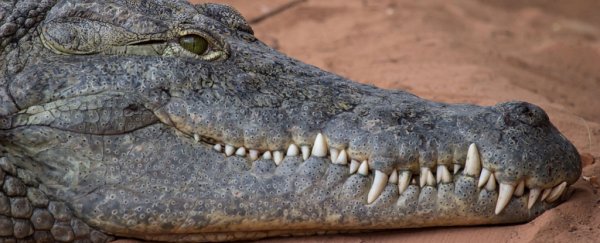As strange as it might sound, not all animals sleep with both eyes closed like we do. For reasons of physical protection, some animals rest in a state known as 'unihemispheric sleep', in which half of their brain turns off but the other half remains alert to detect physical changes in their immediate environment.
And thanks to a new study, we now know that crocodiles engage in this behaviour, Australian and German scientists having discovered for the first time that when they're unihemispherically asleep, they keep one eye open to hold an ever-watchful gaze over their pack or potential predators. Even more useful – because crocodiles don't exactly have a lot of predators – this allows them to keen an eye on any prey that might wander too close.
"These findings are really exciting as they are the first of their kind involving crocodilians and may change the way we consider the evolution of sleep," said lead researcher Michael Kelly from La Trobe University in Melbourne, Australia. "What we think of as 'normal' sleep may be more novel than we think."
The researchers filmed juvenile crocodiles in an enclosure over a 24-hour period to see just how attentive the animals were during sleep. While the crocs did demonstrate sleeping with both eyes shut the majority of the time, this wasn't always the case.
When a new crocodile was introduced to the enclosure, sleeping crocodiles pinned an eye on the newcomer, and they were particularly watchful of the human researchers.
"They definitely monitored the human when they were in the room," one of the researchers, John Lesku, told Jonathan Webb at the BBC. "But even after the human left the room, the animal still kept its open eye… directed towards the location where the human had been – suggesting that they were keeping an eye out for potential threats."
Unihemispheric sleep has previously been observed in birds and some aquatic mammals, including walruses and dolphins. As scientists discover more animals engaging in the behaviour, it makes sleeping with both eyes closed – as normal as that seems to us – seem more like an evolutionary oddity, not the other way round.
"We tend to think of our sleep as the norm: a behavioural shutdown that is a whole-brain affair," said Lesku. "And yet if birds sleep unihemispherically, and if crocodiles and other reptiles that engage in unilateral eye closure – if it turns out that they are also sleeping unihemispherically, then suddenly our sleep becomes unusual."
The findings are published in The Journal of Experimental Biology.
